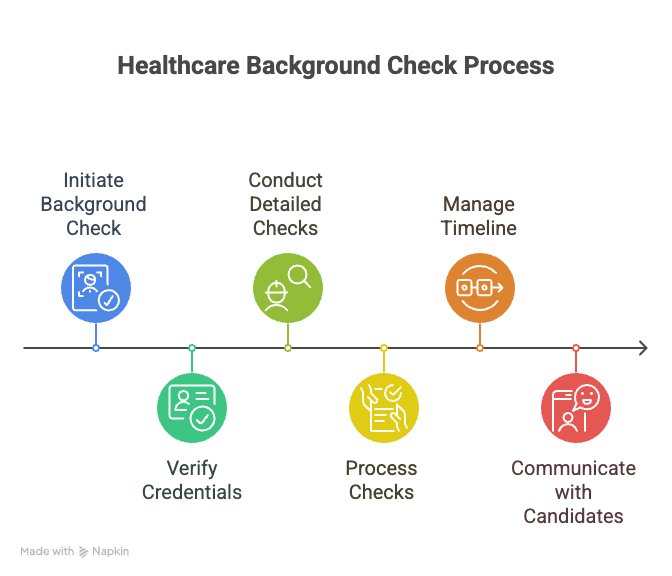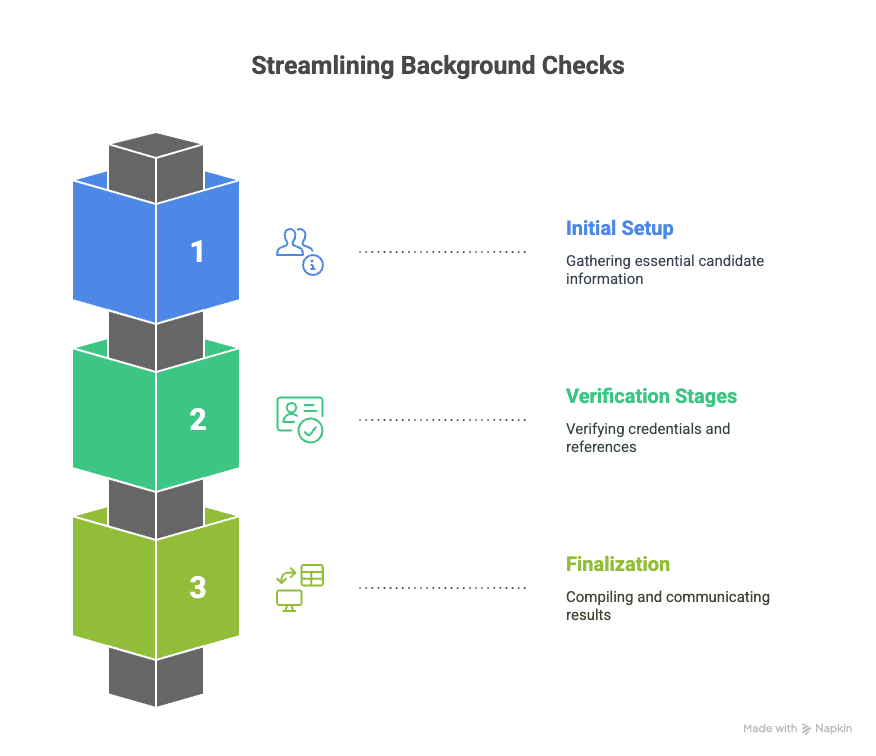Navigating the job market in the healthcare sector can be a complex journey, with background checks being one of the pivotal elements in the hiring process. Understanding how long these checks typically take can help both employers and job seekers plan accordingly. In this guide, we'll explore the healthcare background check turnaround, delve into the factors affecting the timeline, and provide practical advice to streamline the process.
Key Takeaways
- Healthcare background checks are essential for ensuring patient safety and trust by verifying the trustworthiness and qualifications of individuals in the medical field.
- The time required to complete these checks varies based on the complexity of the role, jurisdictional regulations, volume of requests, and the technology used by service providers.
- A typical background check takes one to two weeks but can extend during peak hiring seasons or for more complex roles like physicians.
- Streamlining the process involves using reliable background check providers, ensuring candidates provide accurate information, and maintaining clear communication to manage expectations.
- Proactively addressing common challenges like data accuracy, delays, and legal compliance can make background checks more efficient and effective.
Introduction
Healthcare background checks are the backbone of patient safety and trust in the medical field. They ensure that the individuals tasked with care and access to sensitive information are trustworthy and qualified. These checks typically include reviews of criminal records, employment history, and educational credentials, among other factors. Conducting thorough background checks is not just about rule-following—it's about protecting the most vulnerable and preserving the integrity of healthcare institutions.
This article examines how long these evaluations usually take, factors influencing their timelines, and strategies to manage expectations and reduce delays.
What is a Healthcare Background Check?
A healthcare background check is a thorough investigation used to verify a candidate's suitability for working in the healthcare field. These checks are critical for protecting patients and ensuring the integrity of healthcare services. They aim to identify past behaviors or issues that might pose risks in a clinical setting.
Key components of a healthcare background check include criminal records, employment history, and verification of education credentials. Criminal records checks look for offenses that could jeopardize patient safety, such as abuse or fraud. Employment verification confirms past job titles and tenures, ensuring candidates have the claimed experience. Educational verification ensures that applicants hold the necessary qualifications, such as degrees or certifications, required for their specific roles.
These background checks play a crucial role in building a reliable healthcare workforce. They help institutions verify the trustworthiness of individuals in an industry where safety is paramount. With the well-being of vulnerable populations at stake, these checks serve as a protective barrier, ensuring only qualified and safe individuals are entrusted with healthcare responsibilities.
Are you confident in the systems you have in place to verify such critical information, or is there room for improvement?
Factors Affecting Healthcare Background Check Turnaround
The duration of a healthcare background check can vary widely due to several factors. Understanding these can help you manage expectations and streamline the process.
Complexity of the Check: At the core, the complexity of the background check directly affects how long it takes to complete. A basic check might include verification of employment history or criminal records, which seems straightforward. But when higher positions are involved, such as specialist roles, additional layers like credential verification, malpractice history, and international checks can add time.
Jurisdictional Variations: Different states have varied regulations concerning background checks. Some states might have instant access to certain records, while others require formal requests or have waiting periods. For instance, accessing criminal records can be immediate in some jurisdictions but take weeks in others due to bureaucratic processes.
Volume of Requests: Healthcare organizations sometimes face peak hiring periods, leading to a surge in background checks. During these times, background check services might be overloaded, slowing down the process. If you're hiring during a busy season, expect some delay.
Technology and Resources: Not all background check services are created equal. Providers who invest in advanced technology and have robust resource allocation can generally process checks faster. Those still relying on manual processes may take longer. Choosing a provider with a proven track record for speed and efficiency can make a significant difference.
Consider these factors when planning your hiring timeline. Can you afford delays, or should you plan around them? Understanding the variables at play can help you develop strategies to mitigate delays and improve the hiring process. For instance, partnering with an efficient service provider or starting the background check process early are proactive steps you can take to keep things moving smoothly.
Typical Healthcare Background Check Timeline
A standard healthcare background check usually takes between one to two weeks to complete. This timeframe can vary depending on several factors. For example, a background check for a physician might take longer compared to a nurse due to the need for more detailed credential verification and licensing checks.
The complexity of the role influences the duration of the background check. For positions that involve direct patient care or access to sensitive patient data, more thorough checks are necessary, often extending the timeline. During peak hiring seasons or when a large volume of checks are being processed simultaneously, delays are common.

Organizations can take steps to manage the timeline efficiently. Invest in a reputable background check provider. Ensure all candidate information is complete and accurate from the beginning. Encourage candidates to prepare documents like diplomas or certifications ahead of time. Clear communication between HR and the candidate helps prevent misunderstandings. By being proactive and organized, you can significantly reduce potential delays in the process. Are your current hiring processes set up to minimize such delays?
Step-by-Step Guide to the Background Check Process
Getting a background check right involves a series of strategic steps. As an expert with two decades in employment background checks, I'll break it down for you.
First, there's the Initial Setup. Here, you'll gather essential information from candidates. This usually includes full name, address, Social Security Number, previous employment details, and educational history. Make sure candidates provide consistent and accurate data to avoid hold-ups down the line.
Next comes the Verification Stages. This is where you verify the candidate's credentials—and it’s more than a tick-box exercise. Employment verifications confirm the accuracy of a candidate’s job history. Meanwhile, education checks ensure that claimed degrees and certifications are legitimate. Don’t overlook reference checks; they provide insight into the candidate’s skills and character straight from previous colleagues or managers. Keep the process efficient by standardizing questions and ensuring prompt communication.
Finally, there’s the Finalization step. Once you've gathered all necessary info, compile it into a comprehensive report. This report is your decision-making gold. Make sure it’s factual and thorough. After finalizing the report, communicate the results clearly to the applicant and the hiring manager. Ensure transparency, and maintain open lines for feedback or disputes.

Have you considered how improved accuracy and speed in these steps could transform your hiring process? Every detail counts, so ensure a smooth flow from one stage to the next.
Common Challenges and Solutions
Completing a background check in the healthcare industry is rarely without hurdles. One common issue is data accuracy. For example, outdated or incomplete criminal records and employment histories can slow the process. To tackle this, ensure you regularly update your systems with the latest information from verified sources.
Handling delays is another challenge. Numerous factors, like busy hiring seasons or complex checks involving multiple states, can cause these. Staying proactive helps. Maintain open lines of communication with candidates to manage expectations. This transparency not only alleviates anxiety but often expedites cooperation if additional information is required.
Legal compliance can also be daunting. Each state has different regulations governing background checks. Consulting legal sources, such as the EEOC guidelines, helps maintain compliance. Ignoring these can lead to legal challenges, which are best avoided.
Addressing these challenges head-on with practical solutions can make the background check process smoother for all involved. Have you considered updating your current systems or enhancing communication strategies to reduce these risks?
Specific Scenarios in Healthcare Background Checks
When conducting background checks for healthcare roles, it's important to recognize that each position might face unique challenges. Let's zero in on a couple of scenarios.
Nurse Background Check Process
Nurses often require comprehensive checks due to their direct patient interaction. These checks include verification of their licensing status, any disciplinary actions, and work history. You might find minor complications if a nurse has worked in multiple states. Each state's nursing board might have different requirements and processing times for confirming licensure, which can slow down the process.
Consider a nurse who has worked in three states. Confirming her licenses in each location might require contacting separate boards and maneuvering varied verification processes. If you're hiring such a nurse, factor in additional time for these checks. Also, you might want to check federal exclusion lists that flag individuals barred from federal healthcare programs. This extra step, while time-consuming, is vital for ensuring compliance and safeguarding patient care.
Hospital Hiring Delays
Hospitals often experience hiring slowdowns for a multitude of reasons. One major factor is the sheer volume of hires they process simultaneously. Hospitals also need to verify educational credentials and professional titles, which can require back-and-forth communication with various institutions. If any discrepancies arise, additional time is needed to resolve these issues and obtain accurate data.
For example, suppose a hospital is onboarding a new cohort of interns. The HR team might encounter delays if universities take time to confirm degree verifications, especially during graduation periods. Hospitals can mitigate this by building relationships with local educational institutions to streamline verification requests.
Addressing these specific challenges with a proactive and structured approach makes the lengthy healthcare background check process manageable. Being prepared for these specific scenarios can prevent unintended hiccups and ensure a smoother onboarding experience.
Tips for Employers to Streamline the Process
Choosing trustworthy providers for background checks is crucial. You'll want a service that balances thoroughness with efficiency. One that has a track record of accuracy and timeliness. Research reviews and ask for referrals from other healthcare organizations.
Communication is key. Set clear expectations with candidates about the timeline and process. Let them know what information they need to provide and when. Stay in touch throughout the process to keep them informed. This reduces anxiety for the candidate and helps you manage their expectations.
Utilize technology to speed up the process. Many background check services offer online portals that streamline data collection and reporting. This not only saves time but also reduces errors. Automated systems can send reminders and updates to both HR and candidates, lessening manual follow-ups and paperwork.
What can delay your process? Sometimes it’s incomplete record checking or missing credentials. Work with your provider to identify common bottlenecks and solutions. Standardize your initial information-gathering process to avoid repeated delays.
Consider pre-screening assessments. These can filter out unqualified applicants early on, allowing you to focus your resources on viable candidates. This step can shave days or even weeks off your hiring timeline.
Finally, review and refine your process regularly. Examine completed cases to understand what worked and what didn't. Adjust your approach based on past experiences to improve efficiency in future rounds.
Implementing these straight-forward steps can significantly streamline your background check process, making it more efficient for both you and your candidates.
Conclusion
Summarizing the timeframes and intricacies of healthcare background checks is crucial for a smooth hiring process. You now know the factors that can either prolong or expedite these checks. By adopting best practices like partnering with reliable providers and integrating technology, you can effectively reduce delays. Clear communication remains vital—keep candidates informed to maintain trust and transparency. Stay proactive by keeping up-to-date with evolving industry practices, helping streamline processes further. Your efforts can significantly impact the efficiency of your hiring pipeline, ensuring timely and informed decisions.
Frequently Asked Questions (FAQs)
How long does a hospital background check take?
A hospital background check typically takes one to two weeks. However, it can sometimes be completed in a few days, depending on the complexity and thoroughness required.
What delays a healthcare background check?
Delays can occur due to incomplete information, verifying past employment, or legal issues in your background. Errors in your records can also slow things down.
Why is my nursing background check taking so long?
It could be due to the large number of applications being processed at once. Verifying educational credentials and licenses or waiting for responses from former employers can also add time.
How can I speed up the background check process?
Provide complete and accurate information from the start. Respond promptly to any requests from the institution conducting the check. Keeping your records updated can help.
Do all healthcare jobs require the same background checks?
Not all healthcare jobs have identical requirements. Specific roles may demand different checks, depending on the level of responsibility and access to sensitive patient information.
What information is typically checked in a hospital background check?
This usually includes criminal records, employment history, education verification, and sometimes credit checks. Drug screening may also be part of the process.
Can I start working before my background check is complete?
Some employers may allow you to start under supervision pending the completion. However, this is not always the case, and it depends on the employer's policy.
Will a minor infraction affect my background check?
Minor infractions may not significantly influence the outcome, especially if they are old. However, this can depend on the employer’s policies and the nature of the infraction.
What happens if there’s an error in my background check?
Contact the company that conducted the check to dispute the error. Provide any evidence or documentation needed to correct the issue.
Is my personal information safe during a background check?
Reputable background check companies use secure systems to protect your information. Always verify the credentials of the company conducting the check to ensure your data is safe.

GCheck Editorial Team
Meet the GCheck Editorial Team, your trusted source for insightful and up-to-date information in the world of employment background checks. Committed to delivering the latest trends, best practices, and industry insights, our team is dedicated to keeping you informed.
With a passion for ensuring accuracy, compliance, and efficiency in background screening, we are your go-to experts in the field. Stay tuned for our comprehensive articles, guides, and analysis, designed to empower businesses and individuals with the knowledge they need to make informed decisions.
At GCheck, we're here to guide you through the complexities of background checks, every step of the way.





